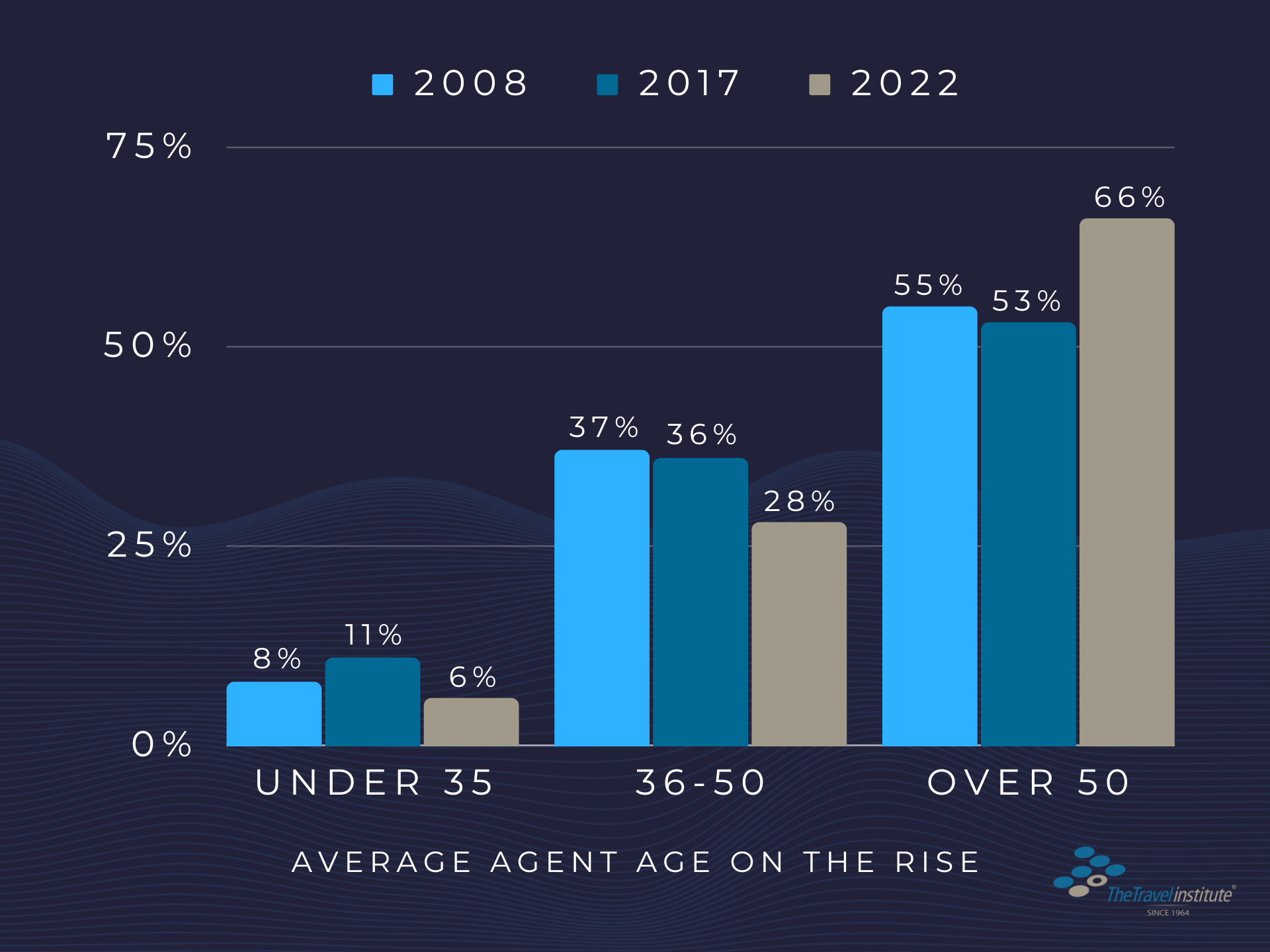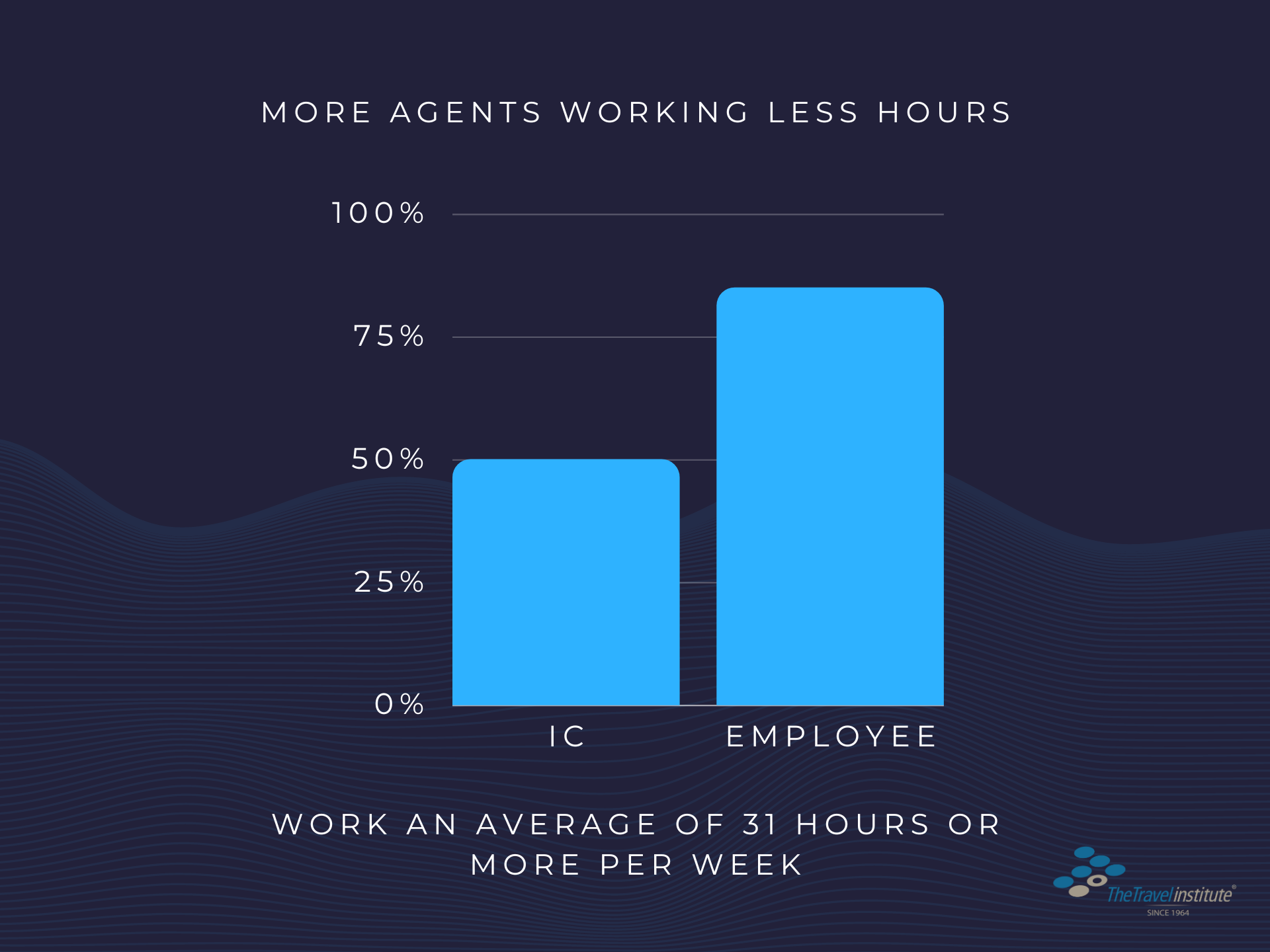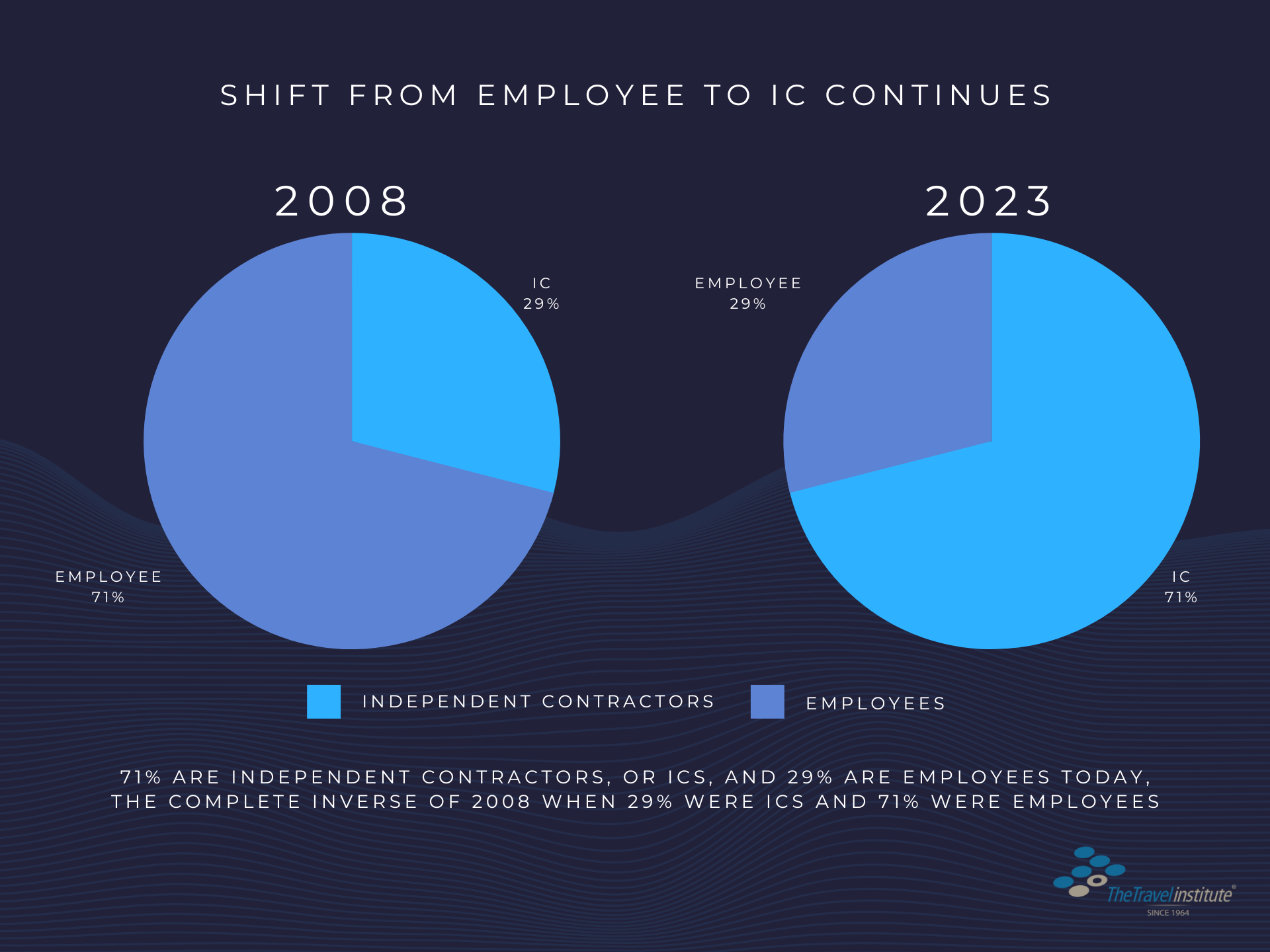
TTI Changing Face of Agents average age rising.

TTI Changing Face of Agents average work week IC and emp.

TTI Changing Face of Agents continued shift to ICs.
COVID concerns fade more broadly but issues remain for travel agents.
FRAMINGHAM, MA – The Travel Institute released initial key findings from its study, The Changing Face of Travel Agents 2023, the third in a series of surveys from the industry’s education leader intended to benchmark various aspects of the agent role while also exploring new and evolving influences. A number of measures in the survey enable direct comparisons with The Travel Institute’s 2008 and 2018 surveys, providing a longitudinal perspective on changes for travel professionals in the industry. Amongst the initial key findings:
- The travel industry continues to operate as a gig economy, attracting agents interested in part-time work with greater flexibility and independence than traditional full-time roles.
– 71% are independent contractors, or ICs, and 29% are employees today, continuing the trend toward the IC agent model: in 2018 62% were ICs and 38% were employees and the complete inverse of 2008 when 29% were ICs and 71% were employees
– 44% of ICs say being an agent now is a career change compared to 31% of employees
– 50% of ICs work an average of 31 hours or more per week compared to 85% of employees who do the same
– 34% of ICs classify their role as part-time compared to 9% of employees
– Combining ICs and employees, 72% with more than 20 years’ experience work 31 hours or more weekly while just 41% of those with under 3 years of experience do the same - Despite high job satisfaction for current agents—74% “love what they do”—there has been a significant exodus of experienced agents in recent years and there is potential for today’s seasoned agent population to “age out.”
– During the pandemic, 36% of agencies lost seasoned staff, 44% report replacing that staff with a combination of experienced and new-to-the-industry agents, and 56% report that they did not replace the staff they lost
– 66% of agents are now over the age of 50 compared to 52% in 2018 and just 11% in 2008.
– At the same time, the “young” agent population has declined—only 6% of agents are under the age of 35 compared to 11% in 2018 and 9% in 2008
The trend of part-time work for ICs seems to mirror employment trends in other industries driven by personal interest, flexibility, a need for supplemental income, and work/life balance. This trend, along with other survey responses, various media reports, and renewed interest in consumer travel1 post-COVID, could signal a shortage of skilled available travel agents to meet consumer demand in the next decade, according to Diane Petras, CTIE, president of The Travel Institute.
Petras asserted the results are “both a wakeup call and an opportunity” for collective industry recruiting and retention efforts well beyond educational needs. “New to the industry does not mean young in the travel industry, which has become an attractive career option in recent years for people from all walks of life and at all stages of their careers, including those looking for a second or even third career. As an industry, this is important for us to understand because we need to ensure we also have individuals in our talent pipeline who are open to a lifelong career in travel. With time and experience, new-to-the-industry dedicated apprentices become our veteran leaders,” explained Diane Petras, CTIE, president of The Travel Institute.
Travel Leaders Network has been partnering with The Travel Institute to recruit and retain agents through attractive educational programs that increase agent success. “Demand for skilled travel agents is high and only increasing. We are putting our best efforts into meeting that demand,” shared Lea Diele, CTIE, VTA, who is senior director, educational services for Travel Leaders Network, citing US Bureau of Labor Statistics2 projecting a 20% increase in agents from 2021-2031. “As an industry, we need to ensure the availability of educated travel advisors and also increase public awareness about the value they bring. Their skills, knowledge, and resources are definitely worth our industry’s investment and well worth any incremental cost for travelers,” Diele continued.
Still, despite a third of travel companies losing seasoned employees through the pandemic, staffing and recruiting are not currently the top areas of concern for 2023 survey respondents. Instead, owners and managers cite the complexities of researching global regulations and traveler anxiety as top issues day-to-day in running their business.
“It’s clear that the end of the US COVID state of emergency does not mean COVID-related stress is over for travel agents. A daily challenge for many agents ongoing is managing traveler anxiety related to COVID and other concerns. A professional travel agent is always balancing logistics with emotions while maintaining their own desire to keep their clients safe and informed. That’s a lot for even the most experienced agents when you think of all the things that can happen before, during or even after a trip -COVID or otherwise- especially an international trip,” Petras acknowledged.
The Travel Institute, which trains 2,000 new agents on average each year through its TRIPKIT introductory training course for industry newcomers, is on track to train approximately 5,000 agents in 2023. So, while the number of new agents currently coming into the industry is high, Petras cautions, their weekly commitment level to serving traveler demand remains to be seen.
In the meantime, Petras said her team’s mission is to continue partnering with educational institutions, industry suppliers and agencies to ensure quality agent education that 1) meets the ever-evolving needs of travelers and 2) that introduces students to agent career options, whether it be as an IC with a host agency or as an employee with a travel industry employer.
“Quality education that gives young new agents the capabilities and confidence they need to dedicate themselves to an agent career and succeed is certainly a critical component for broader industry success. We have new agent training covered with TRIPKIT as the industry’s gold standard,” Petras explained. “Still, industry leadership needs to collectively ensure we are attracting and retaining young, dedicated individuals that we are able to transform into experienced, capable leaders who will eventually take the industry reins and ensure it not only survives, but thrives.”
Tatiana is the news coordinator for TravelDailyNews Media Network (traveldailynews.gr, traveldailynews.com and traveldailynews.asia). Her role includes monitoring the hundreds of news sources of TravelDailyNews Media Network and skimming the most important according to our strategy.
She holds a Bachelor's degree in Communication & Mass Media from Panteion University of Political & Social Studies of Athens and she has been editor and editor-in-chief in various economic magazines and newspapers.































































































































































































































